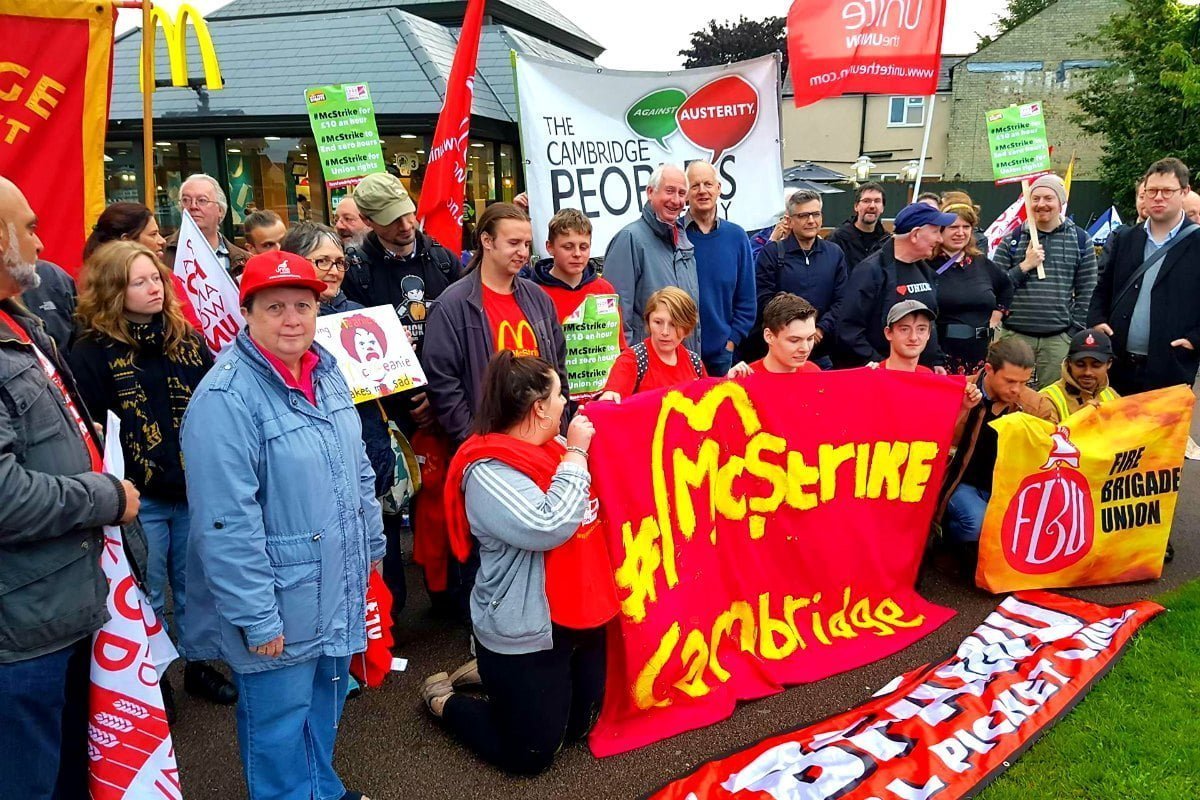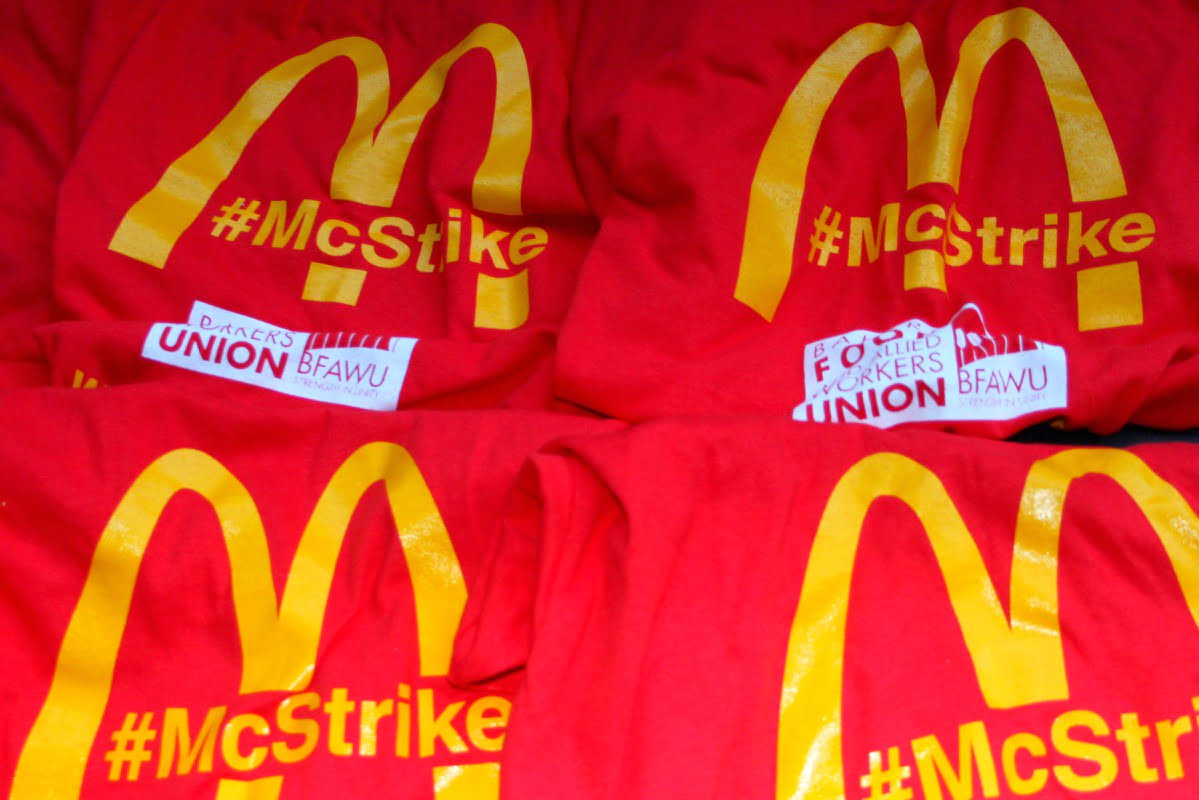Strike action taken by McDonald’s workers last September has forced management into conceding the highest wage rise for 10 years. Moses Levi in Cambridge looks at the recent victory for McDonald’s staff, and discusses the way forward in the struggle for decent pay.
Strike action taken by McDonald’s workers last September has forced management into conceding the highest wage rise for 10 years. Staff at two branches – in Cambridge and Crayford, south-east London – have demonstrated without a doubt the power of a well-organised, militant strike in winning concessions from the bosses.
Gaining support from Jeremy Corbyn and other leading figures in the labour movement, September’s action was the first strike of McDonald’s workers in the UK. Consisting of young workers who have not traditionally been involved in the labour movement, this strike is one of the first signs that a new layer – who can no longer put up with low pay and terrible conditions at work – are coming to the conclusion that united and militant action is needed in order to secure a better future.
Still not enough
Whilst this victory is a major step forward, it is only the beginning. “We’re over the moon, but it’s not enough,” said Steve Day, a crew member in the Cambridge restaurant, talking to the Independent. The 25-year-old will see his hourly pay go from £7.60 to £8.00 on 22nd January, when the changes come into effect. Interviewed by the Guardian during the strike, Day said that he had very recently been homeless and couch-surfing whilst saving a deposit for a room in a house share. Shockingly, he stated that he could only afford to live because he ate all his meals in McDonalds.
The promised pay rises are banded by age. Over 25s, like Steve, receive the highest rate. 21-24-year-olds will receive £7.95 (up from £7.45); 18-20-year-olds will receive £6.75 (up from £6.40); and those in the 16-17 age bracket will receive £5.75, a 65p increase from the £5.10 they were earning in the past.
For Tyrone, a 17-year-old also interviewed by the Guardian on the Cambridge picket line, this will mean a 13% wage increase. At the time, Tyrone was homeless, moving from couch to couch despite working 35 hours per week. The pay rise is a significant concession from the bosses at McDonald’s, who are clearly running scared from the threat of further action. But given the cost of living in Cambridge, one wonders whether it will be enough to really transform Tyrone’s situation and that of others like him.
In April, the minimum wage for over 25s will be raised to £7.83 from its current level of £7.50, reflecting the continual rise in the cost of living. When this happens, Steve and his colleagues will earn only 17p over the minimum wage.
Perhaps McDonald’s management believe that by giving them a pay rise now, they can defuse the movement at an early stage. Instead, however, this concession over wages has raised the confidence of the strikers. Given that McDonald’s CEO, Steve Easterbrook, earned $15.4m in 2017 alone, the giant multinational can hardly be said to be short of cash!
Spread the strike!
 There have also been rumours of the strike spreading beyond Cambridge and Crayford. Speaking to the Guardian in November, Ian Hodson, national president of the Bakers, Food & Allied Workers Union (BFAWU), of whom the McDonald’s strikers are a part, said that, “We are looking at moving [the strikes] right across the country, so we are planning very carefully how that will be done and how workers can take part”. This broadening out of the strike action is exactly what McDonald’s bosses will be hoping to avoid.
There have also been rumours of the strike spreading beyond Cambridge and Crayford. Speaking to the Guardian in November, Ian Hodson, national president of the Bakers, Food & Allied Workers Union (BFAWU), of whom the McDonald’s strikers are a part, said that, “We are looking at moving [the strikes] right across the country, so we are planning very carefully how that will be done and how workers can take part”. This broadening out of the strike action is exactly what McDonald’s bosses will be hoping to avoid.
It is not clear to what extent the pay rise will be rolled out across the country. McDonald’s operates on a ‘franchise’ system, whereby restaurants are actually owned by smaller companies, who pay a fee to McDonald’s to be able to use their branding and advertising and to serve their products. In this profiteering model, the franchisees who own the restaurants are free to set their own pay rates. Whilst Cambridge and Crayford workers are definitely getting the rise, the new pay rates are only a ‘recommendation’ from McDonald’s head office as far as other franchises are concerned.
“WE WON THIS!”, an anonymous worker at the Cambridge restaurant told Cambridge News. “Biggest pay rise for 10 years! If 0.001% going on strike can achieve this, imagine what more can do!”
This is precisely the right attitude. McDonald’s workers have shown that militant action pays. With the bosses on the back foot, now is the time to strike harder, across the country, for a real living wage for all McDonald’s workers. Another – bigger – victory would be an inspiration for young workers everywhere, giving confidence to those in all sectors who are fighting against the scourge of low pay.






